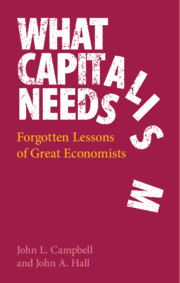
-
Select format
-
- Publisher:
- Cambridge University Press
- Publication date:
- 25 August 2021
- 02 September 2021
- ISBN:
- 9781108768054
- 9781108487825
- Dimensions:
- (216 x 138 mm)
- Weight & Pages:
- 0.51kg, 1 Pages
- Dimensions:
- Weight & Pages:
- Subjects:
- Political Economy, Political Sociology, Politics and International Relations, Sociology
You may already have access via personal or institutional login- Subjects:
- Political Economy, Political Sociology, Politics and International Relations, Sociology
Book description
From unemployment to Brexit to climate change, capitalism is in trouble and ill-prepared to cope with the challenges of the coming decades. How did we get here? While contemporary economists and policymakers tend to ignore the political and social dimensions of capitalism, some of the great economists of the past - Adam Smith, Friedrich List, John Maynard Keynes, Joseph Schumpeter, Karl Polanyi and Albert Hirschman - did not make the same mistake. Leveraging their insights, sociologists John L. Campbell and John A. Hall trace the historical development of capitalism as a social, political, and economic system throughout the twentieth and early twenty-first centuries. They draw comparisons across eras and around the globe to show that there is no inevitable logic of capitalism. Rather, capitalism's performance depends on the strength of nation-states, the social cohesion of capitalist societies, and the stability of the international system - three things that are in short supply today.
Reviews
‘This superb book reminds us of one enduring insight. Economists like Smith, Hirschman, List, Keynes, Schumpeter, and Polanyi understood what modern economics has forgotten. Capitalism does not flourish when markets are fully free. It thrives when they are socially embedded and politically well governed. A turbulent twentieth century has made this pandemic moment ripe for this timeless reminder.’
Peter J. Katzenstein - Cornell University
‘Inspired by the insights of six key economists, Campbell and Hall offer a masterful interpretation of the global political economy from the early twentieth century until today. What political and economic conditions enabled the golden era of prosperity after the trauma of the Second World War? Why did this period end as economic inequality combined with slower growth, greater instability, and resurgent intolerance? And what lies ahead, as China assumes a leading role in the world’s economy? In a compelling and carefully researched analysis, the authors identify the critical conditions upon which the viability of global capitalism depends and map out ways to meet the challenges of the future.’
Bruce G. Carruthers - Northwestern University
‘A capitalist economy is never pure capitalism. Its operation is, as John Campbell and John Hall show us so clearly and effectively, both supported and impeded by an array of institutions and government policies, and it produces consequences that themselves affect the economy’s functioning.’
Lane Kenworthy - University of California, San Diego
‘Graduate and undergraduate students will benefit from reading this book. It forces the (particularly younger) reader to think deeply about where we came from and how we go there … excellent research.’
Matthew C. Mahutga Source: Social Forces
‘The authors succeed, on several occasions, in using language and statistics to make sound and well-argued analyses. They thereby follow the economists of the past who have inspired them, by going beyond equilibria and pareto efficiency to diagnose the time in which they live. May they inspire many more to do the same.'
Ola Innset Source: Journal of the History of Economic Thought
‘Campbell and Hall have both published widely on a range of topics, and are major scholars in their fields. Their co-authored book is ambitious and original. As sociologists, they want to remind economists and policymakers that capitalism is and has always been embedded in a political and societal context … The overview given by the authors is concise, clear, knowledgeable, and helpful.’
Peer Vries Source: International Review of Social History
Contents
Metrics
Altmetric attention score
Full text views
Full text views help Loading metrics...
Loading metrics...
* Views captured on Cambridge Core between #date#. This data will be updated every 24 hours.
Usage data cannot currently be displayed.
Accessibility standard: Unknown
Why this information is here
This section outlines the accessibility features of this content - including support for screen readers, full keyboard navigation and high-contrast display options. This may not be relevant for you.
Accessibility Information
Accessibility compliance for the PDF of this book is currently unknown and may be updated in the future.


